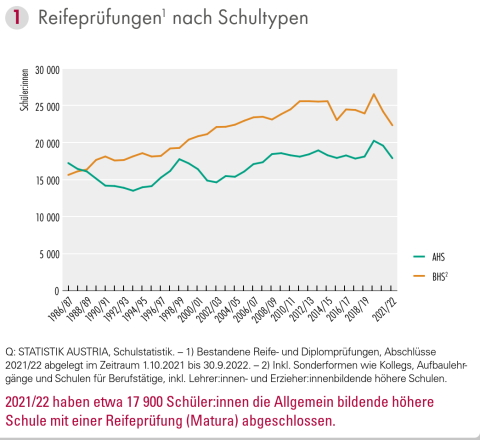Address
Eurydice Informationsstelle
Bundesministerium für Bildung
Abt. Bildungsstatistik und –monitoring
Minoritenplatz 5
AT-1010 Wien
Tel: +431 53120 4716
E-Mail: eurydice@bmb.gv.at
Website: www.bmb.gv.at
Pupil/Students assessment
Regarding performance appraisals and performance assessments, for pre-vocational schools the provisions of the School Education Act apply (§ 17. ff. on classwork and student assessment).
Please see the general information on assessment.
Regarding performance appraisals and performance assessments, for academic secondary school / upper cycle the provisions of the general information on assessment apply.
Academic secondary schools are being modernised by introducing the new course system. Key elements of the new system are:
- Assessment on a semester basis,
- All positive performances will remain valid, only semesters which pupils have failed must be caught up on.
The candidates sitting for the matriculation examination (final exam of academic secondary schools, cf. “Certification”) either take 3 written and 3 oral or 4 written and 2 oral exams. They take the written exams at the same time throughout Austria and have to solve the same tasks in the general education subjects. The oral exams, however, are not defined centrally. As part of the oral exams, pupils present their "pre-academic paper" on a topic they have chosen themselves.
Progression of pupils/students
Pupils at pre-vocational schools who have a negative grade ("fail") in a subject in their annual report can improve their grade by resitting for the exam on the subject matter of the respective subject. This is stipulated in the School Organisation Act.
After positive completion of the school, pupils can enter the first year of a school for intermediate vocational education or other schools not leading to the higher education entrance qualification. Admission to a school leading to the higher education entrance qualification, e.g. an academic secondary school or colleges for higher vocational education is possible if the pupil was in the best ability group in the subjects German, modern foreign language and mathematics and the other subjects were not rated worse than "satisfactory".
Parents and pupils can obtain information about the pupils’ performance at any time during the training period.
Certification
Pupils who have completed pre-vocational school successfully (which means that no compulsory subject has been marked with "fail") must be issued an end-of-year report and final certificate (Jahres- und Abschlusszeugnis), otherwise they will only be handed an end-of-year report. Fulfilment of the nine years of compulsory schooling is also recorded in the end-of-year report and final certificate. Consequently the pupils are entitled to enter into an apprenticeship contract.
Programmes at academic secondary schools are completed with an end-of-year report and final certificate and also the matriculation examination (in German: Reifeprüfung or Matura).
The matriculation certificate certifies the general higher education entrance qualification. All examination candidates who have completed the final year successfully or have been assessed with "fail" in no more than one compulsory subject are entitled to sit for the matriculation examination at the main date (in the last ten weeks of the school year).
Up until the "new Matura" that entered into force in the whole of Austria in 2015, the teachers of the respective subject compiled the questions for the Matura. Since 2015 this has been a standardised matriculation examination that creates the same framework conditions for all candidates.

Figure: Austrian Matriculation Examinations by Gender measured by the arithmetic mean of the 18- and 19-year-old resident population, school year 1986/87 to 2021/2022.
Source: Education in Figures in Austria: Key Indicators and Analyses – edition 2022/23, p.41
.
